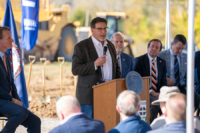Washington County workforce housing project launches
A residential subdivision composed largely of housing intended for the local workforce is coming to Washington County. Gov. Glenn Youngkin, Ardent Development Group owner Jerome Malinay and others attended an Oct. 21, 2025, groundbreaking for the roughly 325-home Sunny Valley subdivision. “Housing’s very much needed … to facilitate and promote the future job growth, the […]
State to allocate $15M to support workforce housing
The Virginia Workforce Housing Investment program will distribute an additional $15 million to support workforce housing development.
Barkin: Affordable housing key to rural economic growth
Richmond Fed President and CEO Tom Barkin said affordable housing and workforce investment are driving population and economic growth in small towns across the Fifth District.
Riverdale project moves forward in Roanoke
Work on the $50 million-plus Riverdale mixed-use redevelopment planned for more than 126 acres on the sprawling former campus of American Viscose, a rayon plant that closed in the late 1950s, is moving right along. Developer Ed Walker shared a lengthy written update on the project Jan. 24 that included a rendering of a 267-unit […]
Youngkin announces plan to grow workforce housing
At the Governor’s Housing Conference in Virginia Beach Thursday, Gov. Glenn Youngkin unveiled the Workforce Housing Investment Program, an initiative at Virginia Housing that will invest $75 million over five years to spur the creation of workforce-priced housing. The funding holds the potential, according to a news release from the Governor’s Office, to “catalyze $750 […]
Work begins on phase 2 of McLean affordable housing development
Construction has started on the second phase of the two-phase Somos at McLean Metro, an affordable housing development backed by Amazon.com, SCG Development, a Tysons real estate developer, announced last week. Work on the 231-unit first phase began in April. Phase B will add 225 new units, a mix of studio and one-, two- and […]


















